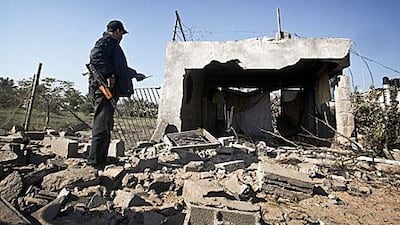TEL AVIV // Israel is preparing another invasion of Gaza exactly three years after a massive three-week onslaught killed up to 1,400 Palestinians.
The threat comes despite reports that Hamas leaders have ordered a halt to attacks on Israel, and amid another round of violence.
At least three Palestinians were killed by Israeli air strikes on Gaza this week and several rockets were fired from Gaza into Israel.
Tensions have also risen between Israel and Gaza factions as Israel steps up its killing of militants it suspects of planning strikes on its territory.
Marking the third anniversary of Operation Cast Lead, which began with a surprise Israeli air strike on Gaza on December 27, 2008, the Israeli military chief Benny Gantz said a new offensive would be launched "sooner or later" and would be "swift and painful".
The chief of the IDF general staff said there were signs the deterrence that Israel achieved in 2008 was wearing off. "Sooner or later, there will be no escape from conducting a significant operation," he said.
Meanwhile Tal Hermoni, an Israeli army commander in the Gaza Division, said: "We are preparing and in fact are ready for another campaign … to renew our deterrence, if we are called on to restore full quiet to the communities [in the south]."
The military chief's plan calls for the next Gaza operation to be shorter than Cast Lead but to employ far greater firepower, according to Israel's Haaretz newspaper.
The paper also reported yesterday that the Hamas leader Khaled Meshaal had ordered the movement's military wing to cease operations against Israel.
The report, quoting unidentified sources from Hamas's West Bank rivals Fatah, said the instructions were issued as part of the reconciliation talks between the two factions in Cairo.
It said Mr Meshaal ordered militant strikes to be ceased not only in Gaza, which Hamas has ruled since violently routing Fatah forces in 2007, but also in the Israeli-occupied West Bank, where Fatah holds sway.
Mr Meshaal issued the orders in late November after the first round of talks with Fatah. The two factions also appear to have agreed to focus on a popular struggle against Israel that is more in line with the pro-democracy demonstrations in the Arab world in the past year.
Israel's threats of a second major operation in Gaza may indicate that the country's security establishment is shifting more military focus towards groups such as Hamas that are closer to its borders, and away from Iran, which Israel considers the archenemy.
Tamir Pardo, the head of Israel's Mossad spy agency, told a meeting of Israeli ambassadors yesterday that a nuclear Iran might not pose an "existential threat" to Israel.
"Does Iran pose a threat to Israel? Absolutely. But if one said a nuclear bomb in Iranian hands was an existential threat, that would mean that we would have to close up shop and go home. That's not the situation. The term 'existential threat' is used too freely," he said.
Mr Pardo's remarks appear to contradict repeated statements by Benjamin Netanyahu, the Israeli prime minister, that Iran represents the biggest threat to Israel.

